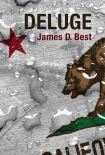Deluge (The Best Thrillers Book 2) James Best (best e book reader .TXT) 📖

- Author: James Best
Book online «Deluge (The Best Thrillers Book 2) James Best (best e book reader .TXT) 📖». Author James Best
“Politicians always fear panic,” Smith said with disgust. “They think common people are only a step above feral animals and will harm each other if uncontrolled.”
Wilson ignored his cynicism and asked who knew people they could call. Baldwin answered that other than politicians, she knew only the telephone numbers of a restaurant maître d’, a hotel concierge, and history professors at Cal State Sacramento and UC Davis. When Wilson said perfect, Baldwin thought she sounded like waitstaff who used the same response to anything a customer ordered. But Wilson meant it. She explained that those professions talked to lots of people all day long. She next queried Smith. He knew people in the area from his mountain climbing club. Since many volunteered for search and rescue, they might choose to stay behind, but they would probably pass warnings on to others. Ashley claimed he had recently changed phones and hadn’t transferred his directory of contacts. Baldwin guessed he really didn’t know anyone in Sacramento. Wilson had friends and relatives in the area.
Before starting the phone calls, Wilson instructed them to tell people they couldn’t disclose where they’d heard the information, but they should feel free to pass it on. She explained that after several generations of calls, nobody would be able to trace the origin. Baldwin thought she seemed overly concerned with the implications to her career. On the other hand, if the storm abated or her calculations overestimated the runoff, government officials would surely look for a scapegoat, and no harm would come from keeping her insubordination concealed.
The calls took over an hour, and afterwards, they settled into silent contemplation. The I-80, always a busy thoroughfare, seemed no worse than normal. Evidently, noncommuters hadn’t decided to evacuate en masse. Even regular commuter traffic appeared relatively light. Baldwin assumed that some people had rented a hotel room for the night in lieu of driving home. In the absence of a government alert, it made sense to stay put and avoid the risk of a car accident in bad weather. Smith drove his Land Cruiser at nearly thirty miles an hour, a good speed during California work traffic. Still, Baldwin’s nerves were on edge. With visibility under fifty feet, she worried about something popping up in front of them. Since she felt compelled to keep a lookout, her eyes felt tired as she stared unblinkingly out the windshield.
“Lean back. Relax,” Smith said to her. “I got this.”
“I can’t,” Baldwin said.
“I insist. You may need to drive. I want you rested.”
“I’ll drive,” Wilson said from the backseat. “I drive heavy USGS vehicles all the time.”
“Good to know,” Smith said noncommittally.
The wipers at the highest speed provided only glimpses of the road before water again distorted the view.
“Perhaps you should slow a bit,” Baldwin said.
“Sherrell, tell her,” Smith said.
Wilson leaned forward to be heard over the drumming rain. “It’s going to get worse. Geological data predicts increased precipitation as the evening progresses. We need to get—”
Baldwin’s laughter interrupted her.
“What’s funny?” Wilson asked annoyed.
Baldwin controlled her laughter and said, “Sorry, precipitation sounds like a wimpy word for what we’re driving through.”
“I’m a scientist,” Wilson said. “I use precise terms. In meteorology, precipitation is any condensation of atmospheric water that gravity causes to fall to earth, including rain, sleet, snow, and hail. Volume doesn’t matter.”
“Fine … I said I was sorry,” Baldwin said in an irritated tone. “The weather’s unnerved me. Please go on.”
Baldwin heard a deep intake of breath, and then Wilson said, “No, I was condescending, and I apologize. I suppose we’re all unnerved. Anyway, the closer we are to the coast, the less precipita—”
Wilson now broke out in laughter.
After a few moments, she choked out, “I just heard myself. I sound like a TV weatherman in a polyester suit. Next, I’ll be telling silly jokes and teasing similarly turned-out coanchors. Let me try again.” She took another deep breath. “It’s going to rain like hell, but the downpour lightens as we approach San Francisco, so we need to make as much speed as safety allows.” She laughed lightly. “How was that?”
“Perfect,” Baldwin said with a grin. “How far to the balmy coastal environs?”
Smith answered from the driver’s seat. “About seventy-five more miles. We’re only to the outskirts of Davis.”
Baldwin frowned. “It’ll be dark soon. That’ll make it even more difficult to see.”
“We’ll be fine,” Smith said from behind the wheel. “Of greater concern is where we’ll bed down for the night.”
“A floor is all I have to offer,” Wilson said. “I live in a studio. Rents are outrageous in San Francisco.”
“If that’s an offer, we may take you up on it,” Smith said. “There won’t be any hotel rooms, not by the time we get there.” He thought for a moment. “Maybe we should drive through the night. What’s the weather forecast to the south?”
Wilson adjusted in her seat and took a breath. “This massive atmospheric river will drop twenty to thirty inches over the next two to three days. Possibly more. The western slope of the Sierra Nevadas will be hit the hardest, and they’ll drain into the Central Valley. Torrential rains will melt the substantial snow base in the High Sierras, adding to the runoff. The next hardest hit will be the eastern slope of the coastal ranges, which will also drain into the valley. Least hit will be the regions along the ocean before the mountains trigger the release of water. The Sacramento-San Joaquin Delta will get buried under the runoff. That’s where we’re heading right now, and it’s important we get through the Delta before it becomes impassable. The nearly five million people who live in the Delta will try to flee south or to San Francisco. The additional million and a half people escaping Sacramento will add to the congestion. At least the lucky ones will. The less fortunate might drown.”
“They will not





Comments (0)